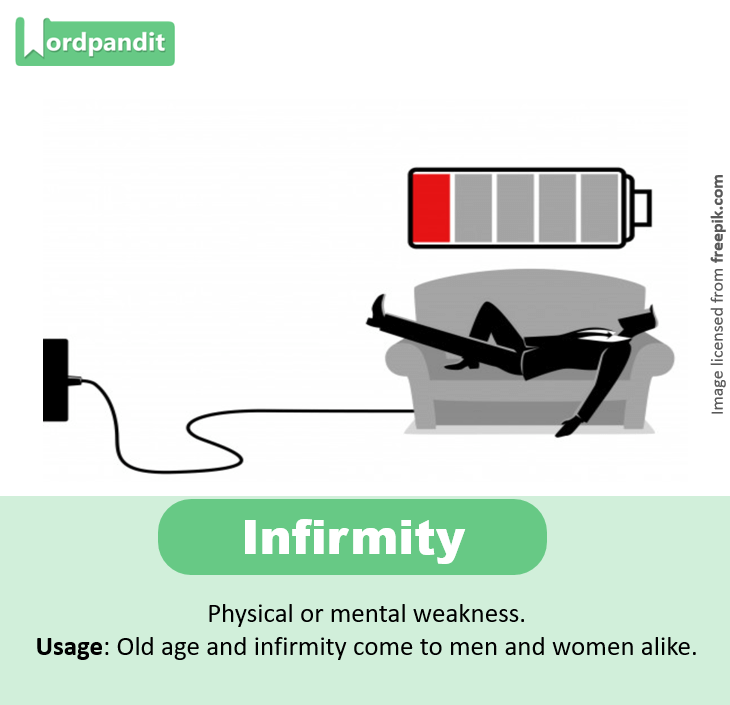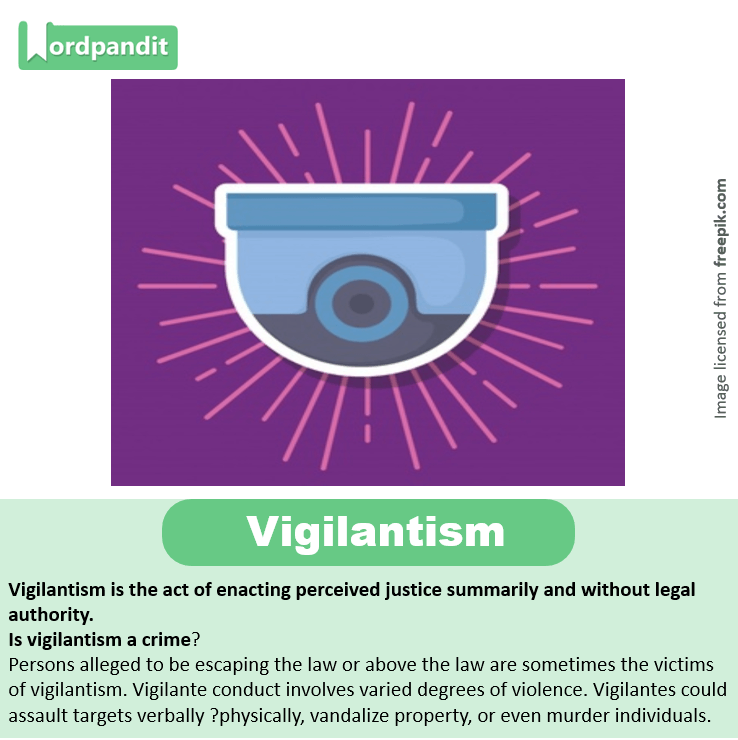1. Infirmity
• Physical or mental weakness.
Usage: Old age and infirmity come to both, men and women.

2. Rampant
• Something unwelcome flourishing or spreading unchecked.
Usage: Political violence was rampant in those years.
Synonyms: uncontrolled, unrestrained, unchecked, and unbridled.
3. Vigilantism
• Vigilantism is the act of enacting perceived justice summarily and without legal authority.
Usage: He says criminologists note the ease with which public hysteria can turn into vigilantism
Is vigilantism a crime?
• Persons alleged to be escaping the law or above the law are sometimes the victims of vigilantism.
• Vigilante conduct involves varied degrees of violence. Vigilantes could assault targets verbally and/or physically, damage and/or vandalize property, or even murder individuals.

4. Assiduity
• Constant or close attention to what one is doing.
Usage: Yet the young mother also hoped the girl could develop the characteristics of persistence, independence and assiduity.
5. Replenish
• Restore a stock or supply to a former level or condition.
• Fill something up again.
Usage: All creatures need sleep to replenish their energies.
6. Instrument of Accession
• The Instrument of Accession is a legal document executed by Maharaja Hari Singh, ruler of the princely state of Jammu and Kashmir, on 26 October 1947.
• By executing this document under the provisions of the Indian Independence Act 1947, Maharaja Hari Singh agreed to accede to the Dominion of India.
7. Schism
• A split or division between strongly opposed sections or parties, caused by differences in opinion or belief.
• A schism is a division between people, usually belonging to an organization, movement, or religious denomination.
• The word is most frequently applied to a split in what had previously been a single religious body, such as the East–West Schism or the Great Western Schism.
Usage: The widening schism between Church leaders and politicians.

8. Meddle
• Interfere in something that is not one’s concern.
Usage: I don’t want him to meddle in our affairs.
9. Naysayer
• A person who criticizes, objects to, or opposes something.
Usage: The naysayers who are alleging that constitutional impropriety has been committed must know that the abrogation of Article 370 Bill was passed by two thirds in the Rajya Sabha and four fifth in the Lok Sabha.
10. Pervasive
• An unwelcome influence or physical effect spreading widely throughout an area or a group of people.
Usage: Current practice in mathematics education is deeply entrenched and pervasive
11. Nay
• Or rather
Usage: Permission to build the superstore will take months, nay years.
• No.
Usage: Nay, I must not think this way,
12. Antithesis
• Antithesis is used in writing or speech either as a proposition that contrasts with or reverses some previously mentioned proposition, or when two opposites are introduced together for contrasting effect.
13. Foment
• Instigate or stir up
Usage: They accused him of fomenting the nation’s peace and harmony through his hateful speech.
14. Maxim
• A short, pithy statement expressing a general truth or rule of conduct.
Usage: The maxim that actions speak louder than words.

15. Accentuate
• Make more noticeable or prominent.
Usage: His jacket unfortunately accentuated his paunch.











